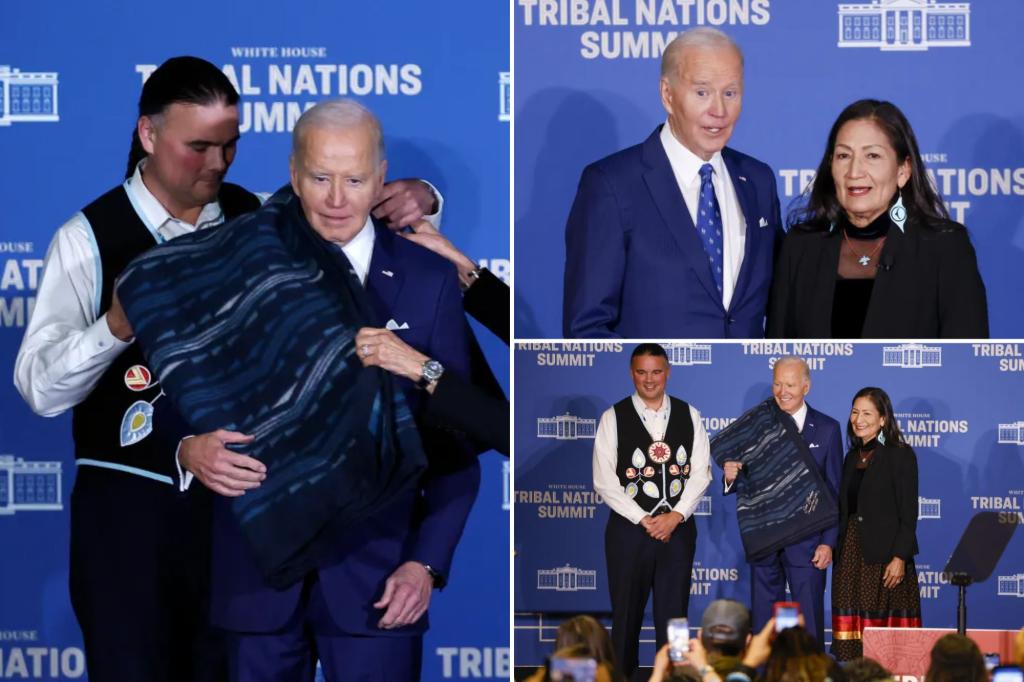President Biden’s fourth and final White House Tribal Nations Summit served as a poignant backdrop for a series of significant announcements concerning Native American communities. The summit commenced with a moving gesture, as Interior Secretary Deb Haaland, herself a Native American, draped a traditional, eighth-generation tribal blanket over the President. This symbolic act underscored the administration’s commitment to honoring and respecting Native American heritage. Biden, acknowledging the recent cold weather he’d endured at the National Christmas Tree Lighting, lightheartedly remarked on the blanket’s timely arrival, injecting a touch of humor into the otherwise solemn occasion.
The centerpiece of Biden’s address was the proclamation designating the Carlisle Federal Indian Boarding School in Pennsylvania a national monument. This institution, operating between 1879 and 1918, became a symbol of the government’s assimilationist policies. Over 7,800 children from 140 tribes were forcibly separated from their families and cultures, sent to the repurposed army barracks to be “Westernized.” Biden unequivocally condemned this historical injustice, emphasizing the importance of acknowledging and learning from past wrongs to prevent their recurrence. The national monument, encompassing 24.5 acres of the former school grounds, will serve as a permanent reminder of this dark chapter in American history, managed jointly by the National Park Service and the US Army.
The establishment of the Carlisle Indian School National Monument serves a multi-faceted purpose. It stands as a testament to the resilience of Native American communities in the face of systemic oppression. It provides a physical space for reflection and remembrance, allowing future generations to grapple with the complexities of the past. And, crucially, it aims to foster healing and reconciliation by ensuring that the stories of the children who passed through its doors are never forgotten. The monument becomes a tangible symbol of the nation’s commitment to confronting its history, however uncomfortable, and working towards a more just and equitable future.
Beyond the monument designation, President Biden unveiled a comprehensive 10-year plan to revitalize Native American languages. These languages, integral to Native American identity and culture, have been severely eroded by the assimilationist policies of the past, including the boarding school system. The initiative recognizes the urgency of preserving these languages, viewing them not just as linguistic artifacts but as vital components of the nation’s cultural heritage. This “all-of-government strategy” aims to expand access to immersion language programs in schools, empower community-led language education efforts, and bolster support for Native language schools and programs. The plan signifies a commitment to reversing the damage inflicted by past policies and ensuring the survival of these languages for future generations.
The revitalization of Native American languages is not merely a linguistic exercise; it represents a broader effort to restore cultural vitality and self-determination. Language is intrinsically linked to identity, worldview, and traditional knowledge. By supporting language preservation, the administration aims to empower Native American communities to reclaim their cultural heritage, strengthen their identities, and pass on their traditions to future generations. This initiative aligns with broader efforts to promote tribal sovereignty and self-governance, recognizing the inherent rights of Native American communities to determine their own futures.
These announcements at the Tribal Nations Summit build upon previous actions taken by the Biden-Harris administration to address historical injustices and support Native American communities. In October, President Biden issued a formal apology on behalf of the federal government for the forced assimilation policies that led to the creation of the boarding school system. Furthermore, the administration has invested $45 billion in Native American programs and initiatives since 2021, demonstrating a significant financial commitment to addressing the needs of these communities. The combined impact of these actions – the apology, the financial investments, the monument designation, and the language revitalization plan – represents a comprehensive approach to reconciliation and empowerment. They signal a shift in federal policy towards acknowledging past wrongs, supporting self-determination, and ensuring a brighter future for Native American communities.











